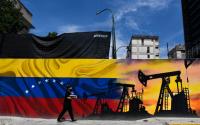18 February 2008
Long a province of Serbia and now Europe's newest nation, Kosovo celebrated wildly into the night yesterday. And who would begrudge the Kosovars their day of unbounded joy after the suffering and deprivations of recent years? The declaration of independence, read out to Parliament by the recently elected Prime Minister, Hashim Thaci, pledged that Kosovo would be a democratic country that respected the rights of all ethnic communities. So far as formalities go, all this looks a promising start.
Kosovo, however, will need all the help it can get, and a good deal more besides. For the next few years at least, nationhood will be more in name than in fact. Small countries can thrive when their political structures are stable, their economies are well organised and when they are accepted, even valued, by their bigger neighbours. With Kosovo, none of these conditions is yet in place. For security, Kosovo will be dependent on outside, mostly European Union, forces. The hangover from yesterday's festivities could last a very long time.
Stability cannot be guaranteed. While independence was long a dream of the Kosovars, for international mediators it reflected more a counsel of despair. Almost 10 years after the Nato intervention which ended the excesses of the Yugoslav President Slobodan Milosevic and facilitated the return of the ethnic Albanian refugees, the two groups had failed to reach any accommodation. The Serbs do not accept the loss of ancestral lands to which they have a deep emotional and religious attachment. The Kosovars, supported by international mediators, were not open to territorial concessions. Impatience was setting in and new violence inside Kosovo was feared.
More dangerous even than Serbia's sense that it is being punished for crimes committed by a previous regime – and here it is worth giving thanks that Serbs elected the more moderate of two candidates for President in recent elections – is the precedent that Kosovo's independence will be interpreted in some quarters as setting. Supporters of Kosovo's independence, who include the US and most countries of the EU, deny that recognition for Kosovo has any wider ramifications. This is not, however, how it is seen by Russia or (Greek) Cyprus or some other countries that believe they could lose or gain ethnic enclaves by analogy with Kosovo.
Initially, at least, international recognition is likely to be incomplete and, even among those who support independence, many will be ill at ease. Kosovo will need to observe the terms of its independence declaration to the letter, and everyone in the region will need to tread carefully, if yesterday's laughter is not to give way to tears. Its long journey to nationhood has only just begun.






